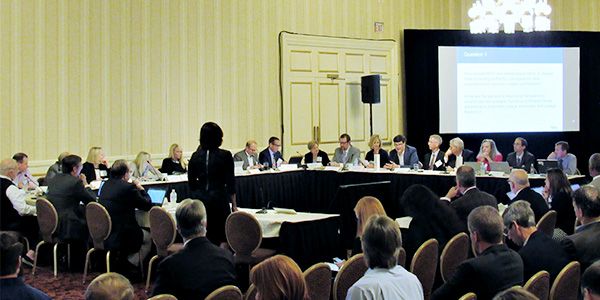MISO members narrowly approved new stakeholder removal provisions this week despite concerns that the rules give the RTO too much latitude.
Advisory Committee members voted 11-10 during a teleconference Wednesday to recommend MISO be able to remove stakeholders and committee leadership for abusive behavior. AC Chair Audrey Penner, who usually refrains from voting, broke a 10-10 tie.
The provisions will be added to MISO’s Stakeholder Governance Guide, though some members called for more talk and reconsideration on the tie-breaking vote.
MISO last month sought to codify its ability to remove the chair of a stakeholder committee and unilaterally ban disorderly stakeholders from meetings. However, some members said MISO’s initial proposed language was too vague. (See Members Send MISO Back to Drawing Board on Stakeholder Removal Rules.)
The revised rules allow MISO to “unilaterally and immediately remove a stakeholder” from meeting participation or a leadership role for being “abusive” to others “through physical, vocal or written means,” threatening physical harm or causing “a disruption or damage while on MISO property.” The grid operator also said it could remove or ban individuals when it has “become aware of information that would justify or otherwise provide a reasonable basis for such an action.”
Some members criticized MISO’s revised proposal as still too broad and subjective and asked for amendments.
Madison Gas and Electric’s Megan Wisersky said MISO’s proposal “disturbs” the transmission-dependent utilities sector and added that it could impede on stakeholders’ ability “to speak freely.”
“We see this essentially as a road to stakeholder censorship in the sense that speech could be deemed as violent if a stakeholder disagrees with MISO. … I know that you might think I’m being hyperbolic about this, but you don’t have to look very far in today’s culture to see speech equated to violence,” she said.
Wisersky said MISO should not be able to oust stakeholders with “standards that are not well-developed.”
MISO General Counsel Timothy Caister said removal provisions are necessary to prevent or stop damage, physical harm and abusive behavior. He said the measures help MISO ensure its responsibility to provide a safe and secure environment.
“This is here for the protection of our employees, our stakeholders and our property,” Caister said. “There might be an instance where we have to remove someone to meet our obligation of safety.”
In 2019, MISO banned a stakeholder from its facilities after the individual sent threatening emails to multiple MISO executives. The incident resulted in two MISO executives filing orders of personal protection against the stakeholder.
“There’s not a good way to clear your name and get back in MISO’s good graces,” Wisersky observed of the stakeholder removal provisions. “If we’re not fired by our own companies, how does a stakeholder get back in the process?”
Caister said MISO didn’t outline a path to getting back inside MISO’s meeting rooms.
“I suspect it will have to be handled on a case-by-case basis. We have that question today, what is that process to re-engage?” he said.
Less hotly debated were separate governance guide rules allowing MISO to remove a committee chair for not being available for meetings or not professionally managing them. MISO recommendations for leadership removal for those reasons would not be immediate and would come after a stakeholder vote, Caister said.





